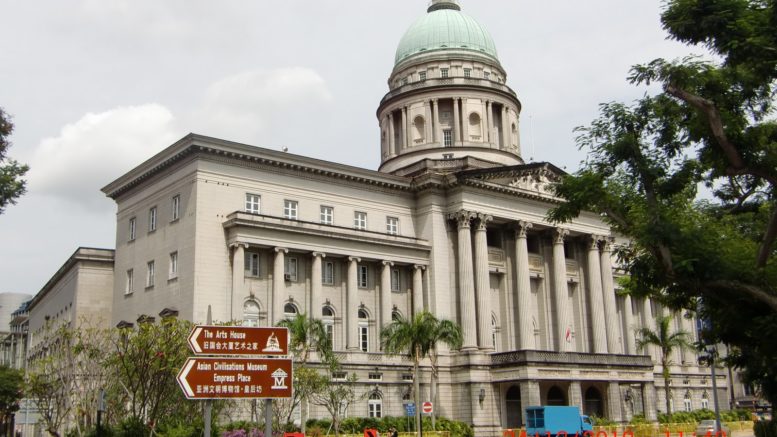With such a sluggish working procedure, how could the national service become fundamental to Singapore’s security and nation building.
I refer to the letter “No cause for suggesting filibustering in Parliament” (Straits Times Forum, Oct 2) in response to the letter “An appeal against filibustering” (Sept 30).
It states that “Mr Francis Cheng insinuates that the Government has “denied” the Workers’ Party’s (WP) adjournment motion on the elected presidency and is filibustering.
This is apparently because some other MPs, myself included, had also filed adjournment motions for both the September and October sittings.
As one of the MPs who filed an adjournment motion at these sittings, I find the adjournment of filibustering absurd.
I first filed my adjournment motion on the “Future of National Service” in July, for the sitting on Aug 1.
Two other MPs, Mr Louis Ng and Mr Murali Pillai, also filed adjournment motions for that sitting. A ballot was conducted and Mr Ng’s motion was picked.
Mr Murali and I, therefore, refiled our adjournment motions for the sitting on Sept 11.
WP’s Ms Sylvia Lim also filed her adjournment motion for this sitting.
Once again, a ballot was conducted and, this time, Mr Murali’s motion prevailed.
Ms Lim and I, therefore, refiled our motions for the next sitting, which is today’s.
Dr Intan Azura Mokhtar also filed an adjournment motion for this sitting and, at the ballot, her motion was picked.
I have, therefore, refiled my motion for the next sitting and understand that Ms Lim has done the same.
The insinuation that I had filed my motion as some kind of filibuster is absurd, as I filed my adjournment motion in July, well before Ms Lim filed hers.
As to “Standing Order 2(8)(d) sets out the procedures for adjournment motions, including that if more than one member raises an adjournment motion for a particular sitting, the Speaker may conduct a ballot to select the topic to be raised” – I was curious about the words “the Speaker may conduct a ballot”.
So, does it mean that the Speaker may have the discretion to select the topic, without conducting a ballot?
Well, I looked at Standing Order 2(8)(d) and it states that “The right to raise a matter on the motion for the adjournment of Parliament shall be allotted to one Member only for each sitting day, if necessary by ballot, under the directions of the Speaker”.
With regard to “The rules of parliamentary debate are set out in the Standing Orders, which are regularly reviewed by a committee comprising both government and opposition MPs” – arguably, is there something wrong with this rule which I understand has been in force for a very long time?
Let’s say for the purpose of illustration – everytime an MP files a motion – four other MPs also file motions.
So, the MP’s chance in a ballot is one out of five.
In this connection, MP Leon Pereira wrote on his Facebook on 25 September “Unlike most developed country legislatures, our Parliament generally sits for 1-2 days month, except for the annual Budget exercise”.
So, given the low probability of one in five in the illustrative example above, and coupled with “Parliament generally sits for 1-2 days month” – does it mean that it may take ages if not forever for an MP’s motion to be successfully balloted?
Also, the backlog of motions may grow over time.
Do other countries’ Parliaments operate like ours?
In respect of “MPs, including Ms Lim, would be well aware of other parliamentary procedures, such as filing a private member’s motion, which would allow them to raise a topic in Parliament without it being subject to a ballot and can be done anytime, if they wish” – why didn’t Ms Lim do this?
Has the writer of the above sentence in the subject forum letter (in his response to Mr Francis Cheng) ever filed “a private member’s motion”?
If not – why not?
As to “This year, Singapore celebrates its 50th anniversary of national service, and the future of national service is of fundamental importance to Singapore’s security and nation building.
As a national serviceman and chair of the Government Parliamentary Committee for Foreign Affairs and Defence, I was inspired by the NS50 commemorations to file this motion” – I agree that since National Service is so very important and “the 50th anniversary of national service” is so significant a moment, and “the future of national service is of fundamental importance to Singapore’s security and nation building” – why didn’t the MP file “a private member’s motion”, instead of simply waiting possibly for the luck of the ballot in the future?
And now – the obvious question – why didn’t he do it when he asked Ms Lim to do it?
In this connection, how many MPs in Parliament have ever filed “a private member’s motion”?
How many “private member’s motion” have been filed this year, last year, in the last 3, 5, 10 years, etc?
By the way, what is the difference between an adjournment motion and a private member’s motion?
Leong Sze Hian
